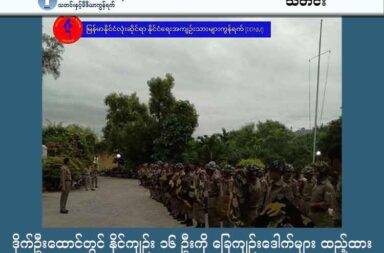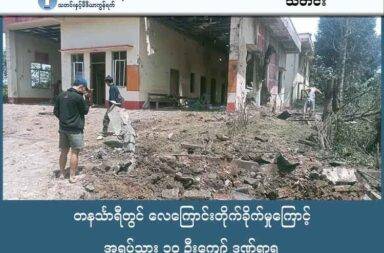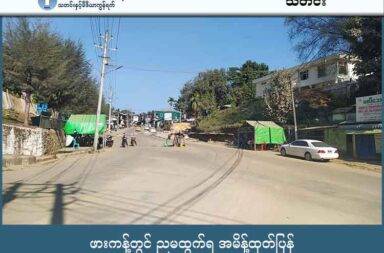NCA Signatory EAOs Form Working Groups to Address Peace Process Deadlock
‘One group will handle deadlock issues and federal issues. Another group will work on the structure of all-inclusive participation,’ said an RCSS spokesperson.
By NETWORK MEDIA GROUP (NMG)
Monday, May 20, 2019
Ethnic armed organizations (EAOs) signatory to the Nationwide Ceasefire Agreement (NCA) formed two working groups in the first session of their fourth summit in Chiang Mai, Thailand.
Held from May 14-18, the meeting concluded on Saturday with a statement that the organizations stand on all-inclusivity and that the working groups will reflect this.
One working group will take responsibility for negotiating with the government on issues on which they remain deadlocked and another working group is tasked with negotiating with other ethnic armed organizations for issues relating to all-inclusivity.
“One group will handle deadlock issues and federal issues. Another group will work on the structure of all-inclusive participation,” Col Sai Nguen, a spokesperson for the Restoration Council of Shan State (RCSS) said.
Each of the working groups is formed with a representative from each of the NCA-signatory EAOs in what Col Sai Nguen said was a “collective leadership system.”
Saturday’s statement also said that in order to overcome deadlocked issues in Burma’s peace process, the signatory EAOs had agreed “to systematically draw up federal principles and then negotiate them with the government and Tatmadaw leaders.”
“The main agreement is how we can negotiate among ourselves to overcome the deadlock issues and to draw up federal principles,” Nai Hongsa, vice chairperson of the New Mon State Party (NMSP), explained.
These issues, he said, include that of the military’s insistence on non-secession from the Union, the creation of one military, and DDR (disarmament, demobilization and reintegration of EAO troops).
“These issues are the perspectives of the Burma Army. We discussed it. Then we came to an agreement about how to overcome these deadlock issues,” Nai Hongsa said.
EAO leaders discussed the possibility of transforming the Peace Process Steering Team (PPST) into the Peace Process Consultative Meeting (PPCM), but there were disagreements on how or if this should take place.
According to Col Sai Nguen, the NCA-signatory EAOs formed working groups because of these issues.
“Currently, our discussions are still underway. So the PPST will still exist,” he said. “We also discussed the Peace Process Consultative Meeting. We will continue our discussions on this issue too… That’s why we formed two working groups.”
Sai Nguen and Nai Hongsa both confirmed that the discussions would continue in the second session of the fourth summit of NCA-signatory EAOS, to be held as soon as possible.
More than 80 representatives of the 10 NCA-signatory EAOS attended the summit, including those from the NMSP, RCSS, and the All Burma Students Democratic Front, Arakan Liberation Party, Chin National Front, Democratic Karen Buddhist Army, Karen National Liberation Army-Peace Council, Karen National Union, Lahu Democratic Union and the Pa-O National Liberation Organization. In addition, representatives from the Kachin Independence Army and the Karenni National Progressive Party attended as observers.


